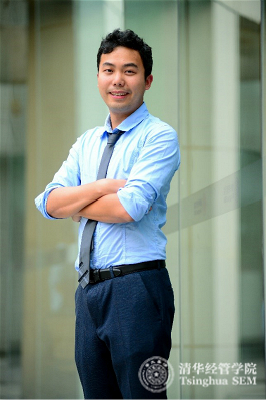Yimin LAI, a student with the Tsinghua-MIT Global MBA program, Class of 2018. He graduated with a Bachelor Degree from Cornell University in Anthropology and Economics in 2004. In 2013, he embarked on a PhD in Anthropology at the University of California, Irvine. Upon graduation from Tsinghua MBA, he will return to the States and continue with his PhD. Yimin says he is not a typical MBA student. Coming to Tsinghua from an anthropology PhD program in the US, he found himself juggling two dreams at SEM: business and academia.”
“My experiences have shaped my hopes to one day become an academic who can translate the business world for academia, and the academic world for businesspersons.”——Yimin LAI
Having immigrated to the United States with my parents in middle school, business has long been my passion: from working as a valuation consultant at KPMG, to my time as a strategy analyst for Live Nation Entertainment, to my entrepreneurial efforts to establish a poker-inspired T-shirt company called Suited Apparel. Yet I have also had a lifelong love affair with academia, education, and research. This might be reflective of my childhood upbringing around Wuhan, where my parents worked as professors in my youth. These two passions led me to my current pursuit of a PhD degree at UC Irvine, where I research business culture using both anthropological theories and my own professional experiences.
My experience have shaped my hopes to one day become an academic that can translate the business world for academia, and the academic world for businesspersons. As an anthropologist, I am required by my department to spend one to two years doing fieldwork outside of the United States, to immerse myself in the understanding of a different culture. I decided to do my fieldwork at Tsinghua. Spending these two years as a student here has lent me a unique perspective of Chinese business through hanging out with partners, friends, and mentors. Their views and our interactions can offer me an insider's understanding of Chinese business, which will ultimately help me become a scholar who delves into the nuances of transnational business cultures.

Yimin LAI
Being a Student:
Tsinghua MBA Program is filled with projects and cases. One of my most memorable projects at Tsinghua was the final project for the Managerial Thinking class, where I used design thinking to come up with a solution to provide care for elderly who do not have relatives to support them. There is a personal dimension to this project as my great aunt was a GuGua elder, and caring for GuGua elders is an issue I care deeply about. I had previously taken product design classes in the US, which were similarly modeled on the IDEO model, but it was great to see how the design thinking process worked in a Chinese setting. As an anthropologist, the project also became very meta as I found myself doing fieldwork and conducting ethnographic research but in a completely applied setting. Ultimately, I think we gained insights into the actual needs of certain types of GuGua elders. Contrary to popular belief, the elders did not feel lonely. Rather, they just want to be noticed by their neighbors, to be heard by their communities, and to remain helpful to everyone else in society. Working off of this, we devised a "Legacy Knots" program, an after-school program that brings middle schoolers and elders together, so that the elders can have an audience for their stories and advice. I hope our solutions will not simply remain in a project setting and will give some organizers ideas in helping elders.
Another great series of projects during my time at Tsinghua was working with Creditease, a local FinTech company, on several different case competitions and consulting projects. Forming a team called "Hero Bears,”we designed a marketing solution for Creditease's investment management software, called Toumi, which focuses on long-term index investing and portfolio diversification. Working with a group of creative classmates from Singapore, Hong Kong, and Japan, we tailored the marketing mix to be priced and promoted differently to attract the young urban investing crowd that the company wanted.
Entrepreneurship:
It would be remiss for me to not mention the vibrant startup community at Tsinghua. An allure for many international students is to be plugged into the startup community at Tsinghua x-Lab, a school run organization that connects business students to different Tsinghua affiliates, engineers, designers, medical doctors etc. The results are a mishmash of different projects that sit in and out of the school, from algorithms which predict music tastes to new cancer detecting technologies using state of the art research from Tsinghua.
Life outside of Class:
Being stuck studying in Haidian has its benefits. It makes connections between classmates that much stronger. That is not to say that there is not life outside of books. Beijing itself offers many historic sites to visit, with spots nearby, like Inner Mongolia and Hebei, are great for weekend getaways. As a class, we ventured to explore the frozen ice sculptures of Harbin, and had water fights in the nearby rivers of Shidu for some unforgettable memories.
Networks:
Finally, the school maintains close ties with its alumni network. The booming Private Equity (PE) industry in China is hiring many students from Tsinghua who often do not want to go through the traditional IBD route. A significant number of my classmates have found internships with local and international funds around China, often through the strong alumni network established by the school throughout the years. For those who are interested in a non-traditional path to buy-side finance, Tsinghua is the place to be.
 Latest News
Latest News